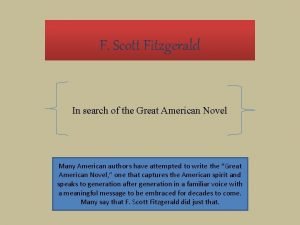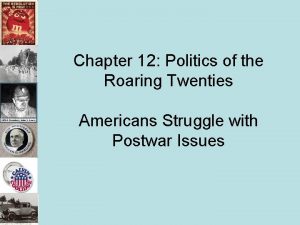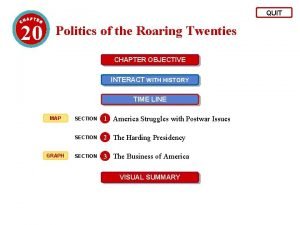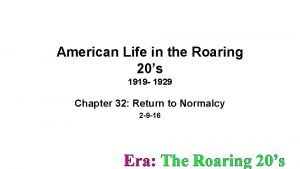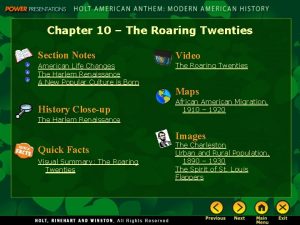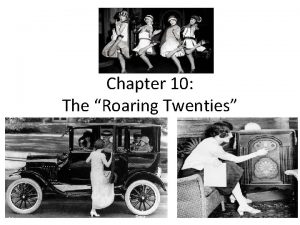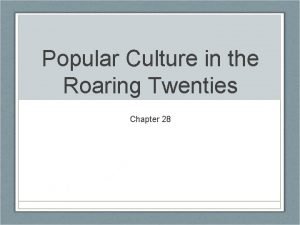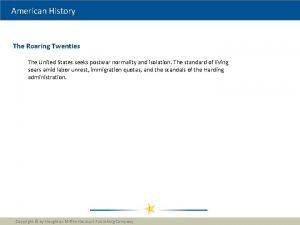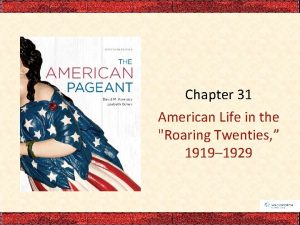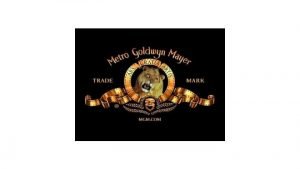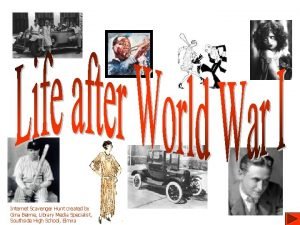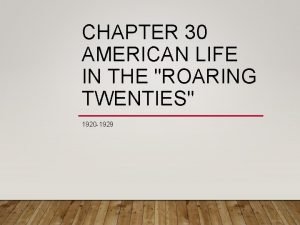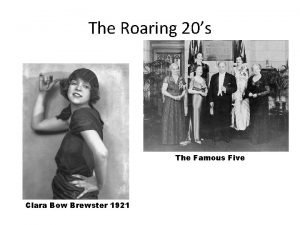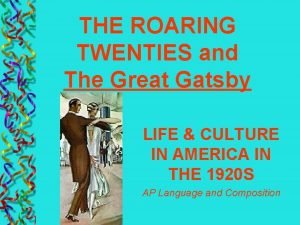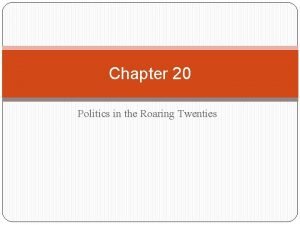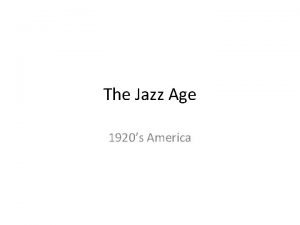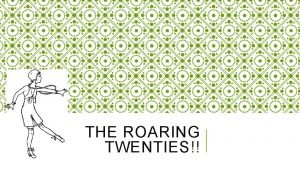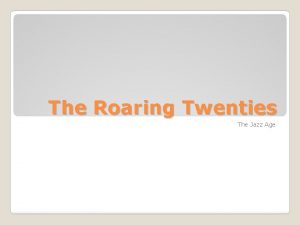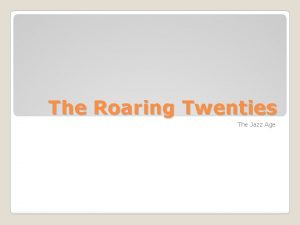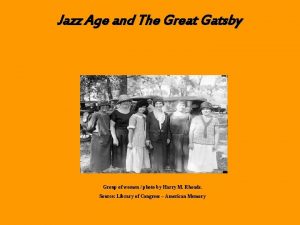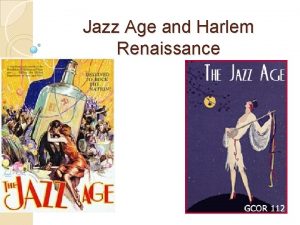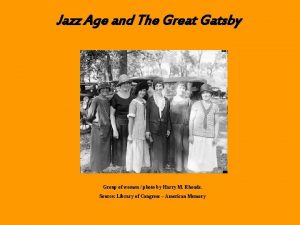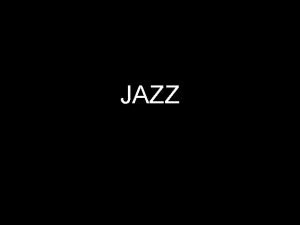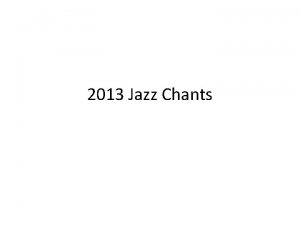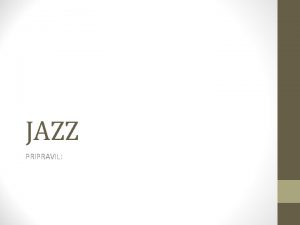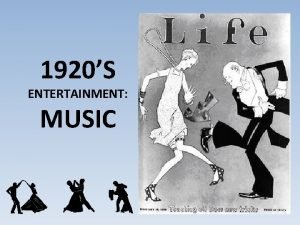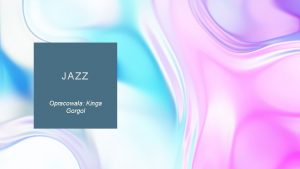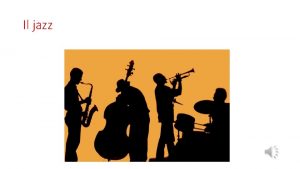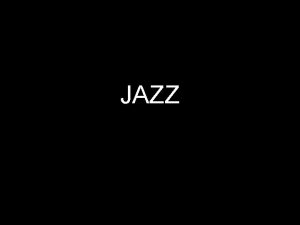The Roaring Twenties America during the Jazz Age
















- Slides: 16

The Roaring Twenties America during the “Jazz Age. ”

The Postwar Economic Downturn 1919 -the U. S. economy suffered a serious downturn. National Income dropped there was high unemployment and laborers were unable to buy the new technology of the time.

African-Americans • African-Americans had undergone a Great Migration north during the war. The North was seen as the land of hope but the end of the war limited their employment opportunities. • 369 th Regiment, 1919, shows the African American fighting unit of World War I. (van der zee)

Competition for Jobs • Severe downsizing developed into class and racial tensions and burgeoning intolerance. • Workers Unions were met with violence, government arrested members of left-leaning political parties and instituted anti-immigration legislation • Groups like the KKK persecuted members of minority groups and the U. S. government jailed black leaders advocating black power, like Marcus Garvey. • Fundamentalists battled scientists over evolution • Government plagued with scandal and corruption.

Political Scandals • President Harding failed to diffuse the tensions that permeated postwar society • His Cabinet was corrupt • Attorney General Daugherty and other presidential favorites allowed political allies to break the law, accept bribes and graft. • Teapot Dome Scandal • A. Fall leased the Navy’s gas reserve to private interests

Teapot Dome

Labor Unrest • 1919= 3, 600 strikes protesting wage cuts and long hours with no overtime pay. • Most laborers faced rigid and violent opposition • Major strikes included United Mine workers and the Boston Police Strike among others. • Union Membership dropped

American Radicalism • Labor linked to Anti-Communist Fears • Small portion of Radicals in the US did seek to destroy the existing political order and promote anarchy. • From 1919 to 1920 anarchists delivered a series of bombs to political officials’ homes and offices nationwide • 1919 -Attorney General’s A. Mitchell Palmers house was bombed leading Palmer to declare • “that organized crime directed against organized government in the country shall be stopped”

The Red Scare • The Government organized attacks on Radicals and foreigners • Attorney General Palmer mobilized officials to arrest communists, these were know as the Palmer raids

Anti-Immigration Laws • The National Origins Act set an Immigration quota of 2% of each nationality living in the U. S. in 1890. • Large decline in Immigration from Southern and Eastern Europe. • Restrictive Legislation on Asian immigrants • American Civil Liberties Union (ACLU), worked to represent “the rights of both individuals and minorities [which were being] violated. ”

The Sacco and Vanzetti Trial • Happened in 1920 and was the culmination of various postwar societal tensions. • The prosecutions case lacked sound evidence but neither man could secure a written alibi and both had loaded weapons when arrested. • Both were executed, in 1927.

Rising Intolerance • Organized racial discrimination • Asians in California • African Americans in Midwest • Anti-Semitism in the business community • Mexicans in the Southwest • The new KKK-restarted in 1915, claimed to be patriotic, benevolent organization that supported education, morality, and charity opposed to • Catholics, blacks, Jews, immigrants, homosexuals, Asians, drug dealers, “wild women, ” the pope, F. D. R. • Conducted swift justice on people they believed deserved punishment • Began declining in 1925

From Intolerance to Violence • Racial Riots • St. Louis 1917 • 1919 -Red Summer, over 20 Major Racial riots killed or injured hundreds of people • Lynching-dramatic illustrations of racist violence

Marcus Garvey and Black Pride • African Americans looked for new leaders in the movement who had alternative solutions • Millions turned to Marcus Garvey who promoted • Black Pride • Separatism • The Universal Negro Improvement Society (UNIA) • Sought to empower African Americans toward • Economic, religious, psychological, & cultural independence • Also promoted a separatist vision of African Americans returning to Africa.

Marcus Garvey and Other African American Leaders • Booker T. Washington • Famous for prioritizing black economic gains as a route to social equality. Differed with Garvey’s separatism • W. E. B. Du. Bois • Famous for pushing African American Political Influence • James Weldon Johnson • Led the NAACP, and fought for legislation to protect African American Rights and outlaw lynching.

The Science and Religion Debate • Science, Fundamentalism and Modernism • The Scopes Trial (AKA The Monkey Trial) • Famous People at the Trial • Clarence Darrow- Famous Defense Attorney • William Jennings Bryan-Prosecution Witness, former Presidential Candidate • John Scopes-science Teacher backed by the ACLU • The Case became a two-sided argument between science and religion
 The roaring 20’s / jazz age
The roaring 20’s / jazz age Politics of the roaring twenties chapter 12
Politics of the roaring twenties chapter 12 Chapter 20 politics of the roaring twenties answer key
Chapter 20 politics of the roaring twenties answer key Roaring twenties acrostic poem
Roaring twenties acrostic poem Chapter 20 politics of the roaring twenties
Chapter 20 politics of the roaring twenties Chapter 10 the roaring twenties
Chapter 10 the roaring twenties Chapter 10 the roaring twenties
Chapter 10 the roaring twenties Chapter 28 popular culture in the roaring twenties
Chapter 28 popular culture in the roaring twenties The roaring twenties lesson 3 changing ways of life
The roaring twenties lesson 3 changing ways of life Chapter 31 american life in the roaring twenties
Chapter 31 american life in the roaring twenties The roaring 20s were characterized by:
The roaring 20s were characterized by: The roaring twenties canada
The roaring twenties canada Five effects of the great depression
Five effects of the great depression Chapter 30 american life in the roaring twenties
Chapter 30 american life in the roaring twenties Roaring twenties acrostic poem
Roaring twenties acrostic poem Roaring twenties great gatsby
Roaring twenties great gatsby Chapter 20 politics of the roaring twenties
Chapter 20 politics of the roaring twenties
